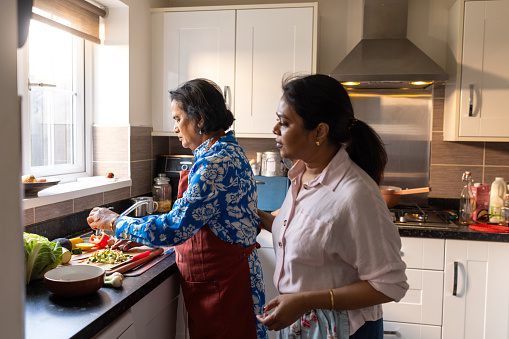2 of a 3-Part Series, By Penny Waller Ulmer, MACP, Registered Psychologist
Grieving What Hasn’t Ended: The Hidden Losses of Dementia Caregiving
Grief is often imagined as something that begins after death. But for many care partners of persons living with dementia, grief begins long before the end, and it doesn’t follow a predictable path. It can rise and fall across days, echo through ordinary moments, and quietly reshape relationships, identities, and daily life.
Some care partners describe feeling like they are “losing someone in slow motion.” Others speak of moments when the person they love reappears, only to fade again, leaving them caught between hope and sorrow, presence and absence - ambivalence. The person is still physically present but may no longer be emotionally or relationally accessible in the same way.
Unlike bereavement after death, dementia-related grief may go unrecognized or unsupported. It doesn’t always receive the rituals, casseroles, or comfort that accompany other kinds of loss. And yet, care partners are carrying something very real. The grief is cumulative: laughter, shared decision-making, conversation, independence, freedom, and a sense of control.
Grief in the Adult Child
Some care partners express sorrow over role reversal and feeling sandwiched between caregiving for children and a parent. An adult daughter may find herself fielding school problems, extracurricular activities, teen friend-dynamics, work-demands, romantic concerns, grocery shopping, and medical appointments while also trying to answer her mother’s repeated question about a husband who died a decade ago. “I’ve lost being the daughter,” she says. “I have to be the adult in every room.”
Others speak of the grief of relational rupture, the pain of a relationship that may never heal. When dementia intervenes before there is time for reconciliation, care partners can be left carrying unresolved hurt alongside the practical demands of care.
For some the grief may focus on the parent’s role as a source of safety and wisdom. The loss of that grounding presence, the one who once knew how to respond to a crisis or offer a cultural perspective, can feel disorienting.
Grief in the Spouse
Caregiving can bring profound changes in identity. Spouses often grieve the fading of shared rituals and long-standing dynamics such as the jokes, the glances, and the unspoken understanding of a shared cultural era.
One man described watching the woman who once finished his sentences now struggle to remember his name. “It’s not just her memory that’s going,” he said. “It’s our memories. Our inside jokes. The version of the world we built together.”
A spouse who lived through various cohort events alongside their partner now feels more alone in the world. Not only are personal memories lost, but the shared experiences of the past no longer have the same container of understanding and lived experience. Think: Cold War and the fall of the Berlin Wall, Civil Rights and Social Movements, AIDS Crisis, Tech Boom.
“I feel like I’m not allowed to feel this.”
Many care partners wrestle with disenfranchised grief, a phrase first coined by Dr. Kenneth Doka, relating to loss that goes unrecognized and unsupported. Care partners may internalize this as a belief that they shouldn’t feel this way or don’t have the right to grieve.
This can be especially true when families disagree about care decisions or when partners feel isolated, judged, or unsupported. Emotional pain may become muted, pushed down, or wrapped in guilt. Over time, this suppression can take a toll.
According to Rupp et al. (2023; 2025), unrecognized caregiver grief can interfere with coping, increase vulnerability to depression, and lead to poor longer-term mental health outcomes. But acknowledging grief can support emotional resilience.
Five Gentle Invitations
If you’re reading this and thinking, “That sounds like me, but I’ve never called it grief,” you’re not alone. You don’t need to name every feeling or explain every tear. You might simply start by noticing the moments that feel tender, or the ones that catch you off guard. Grief in caregiving doesn’t always need to be solved. Sometimes it just needs room to exist, to be seen, heard, and held without judgment.
1. Let the Grief Be Messy, Because It Is
You don’t have to make peace with every loss as it’s happening. Some care partners find themselves grieving the loss of a shared laugh, then suddenly being pulled back into hope when their loved one remembers something out of the blue. It’s not linear. It’s not clean.
You might think:
“She was gone yesterday, but today she knew me. What do I do with that?”
That feeling may feel like it demands resolution, but perhaps it can just exist.
Grief in dementia caregiving is often layered with relief, guilt, irritation, love, and even flashes of joy.
There is no right way to feel. There’s just your way.

2. Recognize the Grief of Identity, Time, and Freedom
Caregiving often reorganizes a life, not just in tasks, but in identity. You may find yourself thinking:
“I used to be someone who had time to go for walks. To work. To rest. To dream.”
Those changes carry weight.
For adult children, it might feel like a shift from being cared for to carrying everyone.
Even if you chose this role out of love, the grief of losing your former life or the freedom to be spontaneous, spacious, or simply off-duty is real. It deserves acknowledgment, not comparison.
You might say to yourself,
“My life has changed, and I’m allowed to miss what I had. Missing it doesn’t mean I’m failing. It means it mattered.”
“This frustration might be grief in disguise. I miss the version of me that had room to breathe.”
If that feels familiar, it might be a quiet signal that you're carrying more than anyone can see. Support isn't just for crisis - sometimes it’s what makes space to explore needs or changes.

3. Honour the Loss of Emotional Anchoring
Some care partners speak of a deeper kind of disorientation, the loss of someone who once helped them understand the world. The grief of no longer having a parent or partner who gets it, who understands the cohort, the culture, and the shared shorthand.
One care partner said,
“I used to joke that my dad was a walking encyclopedia, except better, because he had heart. Politics, war, culture shifts, he made them human. Now when I share a headline, he smiles politely and changes the subject. I’ve lost my compass.”
That kind of anchoring, emotional, historical, relational, doesn’t have a name in most conversations. Some care partners describe it as feeling the weight of the torch being passed - unceremonially. You may now be the one others turn to, even as you are losing the person who steadied you. That shift can feel grounding and destabilizing all at once.
You might quietly say to yourself:
“It’s okay to feel unsteady while I find my footing.”
Some care partners find it helpful to rest a hand on their chest or thighs, somewhere they feel their own steadiness, just to remember they are still here, still held, even without the one who used to hold the map.
You might carry that grief quietly. But it still matters

4. Grieve the Relationships That Won’t Repair
Not every story is one of closeness or sweetness. Some care partners step into this role after years of hurt, distance, or rupture. They may hope for healing that never comes or find that dementia has closed the window for reconciliation.
That grief is sharp. And it can be hard to speak aloud.
You might think:
“I wanted more time to repair things.”
Or:
“I’m still angry, and now I’m also heartbroken.”
You are allowed to grieve both what was and what will never be. Caregiving doesn’t cancel old wounds. And grief doesn’t mean you’ve failed at forgiveness. It simply means something mattered.

5. Make Room for What Others Don’t See
Much of dementia caregiver grief is disenfranchised, unrecognized by others or even by ourselves. Some feel guilt because their loved one is still alive and for others, their grief may not be seen or understood if they are outside the primary family.
Sometimes this grief becomes self-disenfranchised, a quiet, internal message that says:
“I should be coping better. I shouldn’t feel this sad.”
But your sadness isn’t self-pity. It’s love, pressed up against reality.
You might speak to that reality: “We are both grieving. At different moments, in different ways. And while I offer support, I’m grieving having that returned.”
Or, you might offer yourself a look through a different window: “…And while I offer support, I can soothe with the smile I receive, knowing the grieve remains but it’s maybe easier to bear.”

Final Thoughts
Grief in dementia caregiving often hides in plain sight, in the missed conversations, the quiet longings, the moments of losing and finding again. It doesn’t follow rules. It isn’t a conclusion and it doesn’t wait for ceremony or permission. Some losses don’t need solutions, just room to breathe, and a little kindness toward the parts of you still aching for what was.
Let your grief be real. Let your love be messy. When we brace against the grief, we narrow the room we have for other feelings, for meaning, and for ourself.
Both belong.
About This Post and Supporting Research
This post is for general educational purposes only and does not constitute psychological advice or therapy and is not intended to replace personalized care from a licensed mental health professional in Canada.
Rupp, L., Seidel, K., Penger, S., & Haberstroh, J. (2023). Reducing dementia grief through psychosocial interventions: A systematic review. European Psychologist, 28(2), 83–94. https://doi.org/10.1027/1016-9040/a000501
Rupp, L., Abele, C., & Haberstroh, J. (2025). Do mental health professionals recognize dementia grief? GeroPsych: The Journal of Gerontopsychology and Geriatric Psychiatry, 38(1), 11–22. https://doi.org/10.1024/1662-9647/a000340
关于 Stellocare
本篇文章来自 Stellocare,加拿大值得信赖的心理健康专业名录。我们连结通过严格审核的持牌治疗师、社工与心理学家,为您带来真实可靠的专业资讯。
本文作者为 Penelope Waller Ulmer,是我们平台上的认证治疗师。您可以在下方进一步了解他/她的专业与治疗风格。






